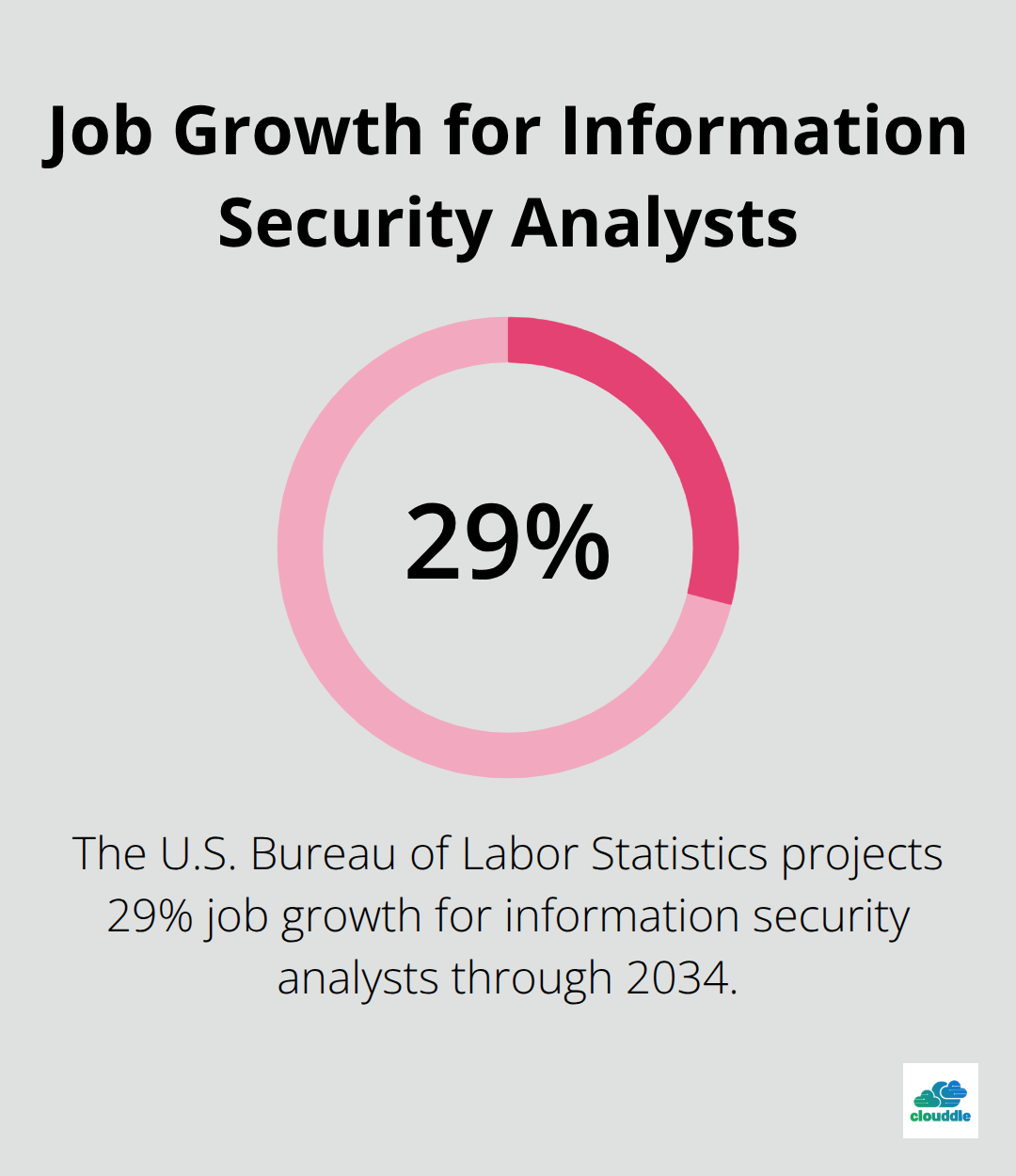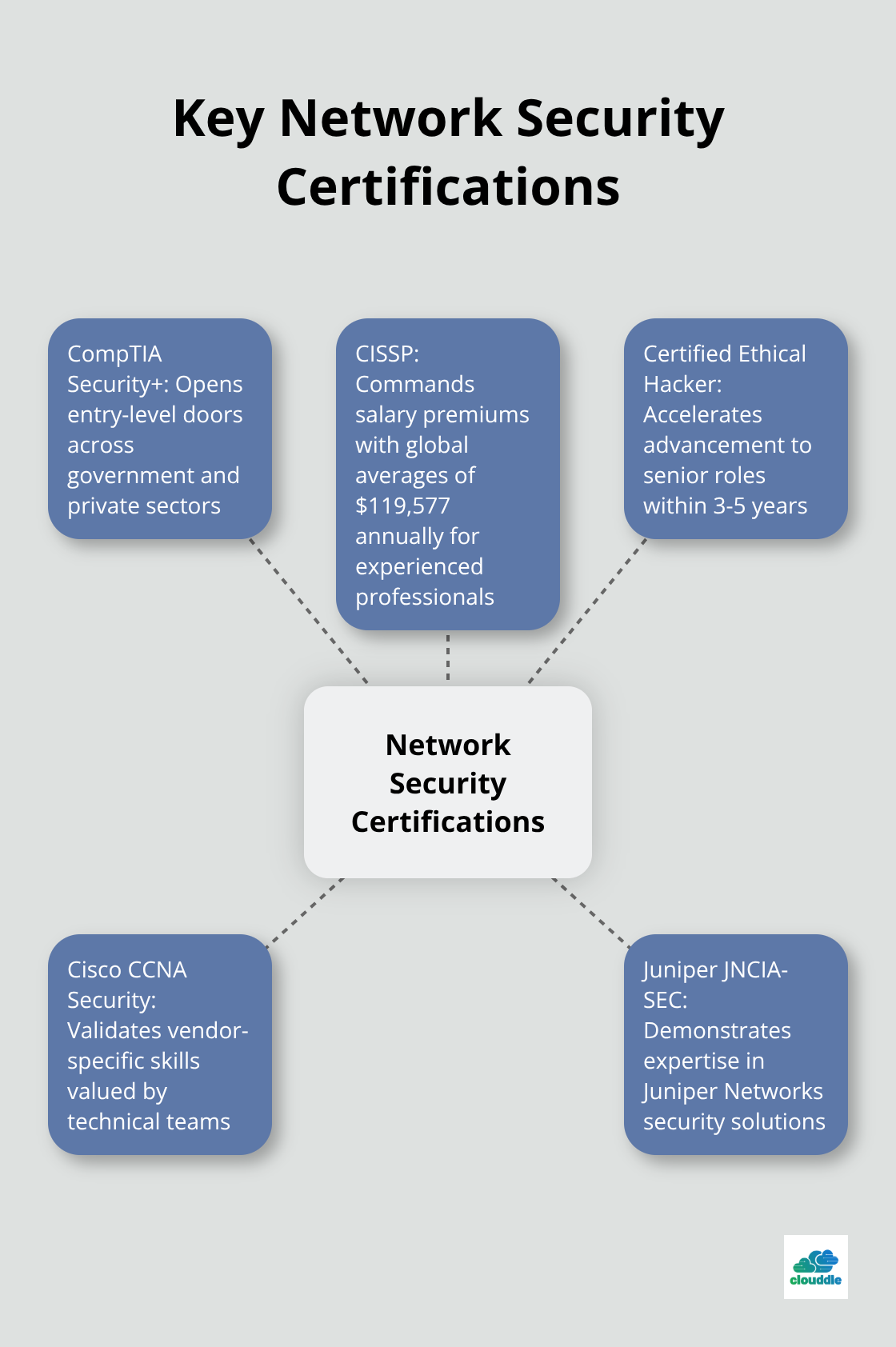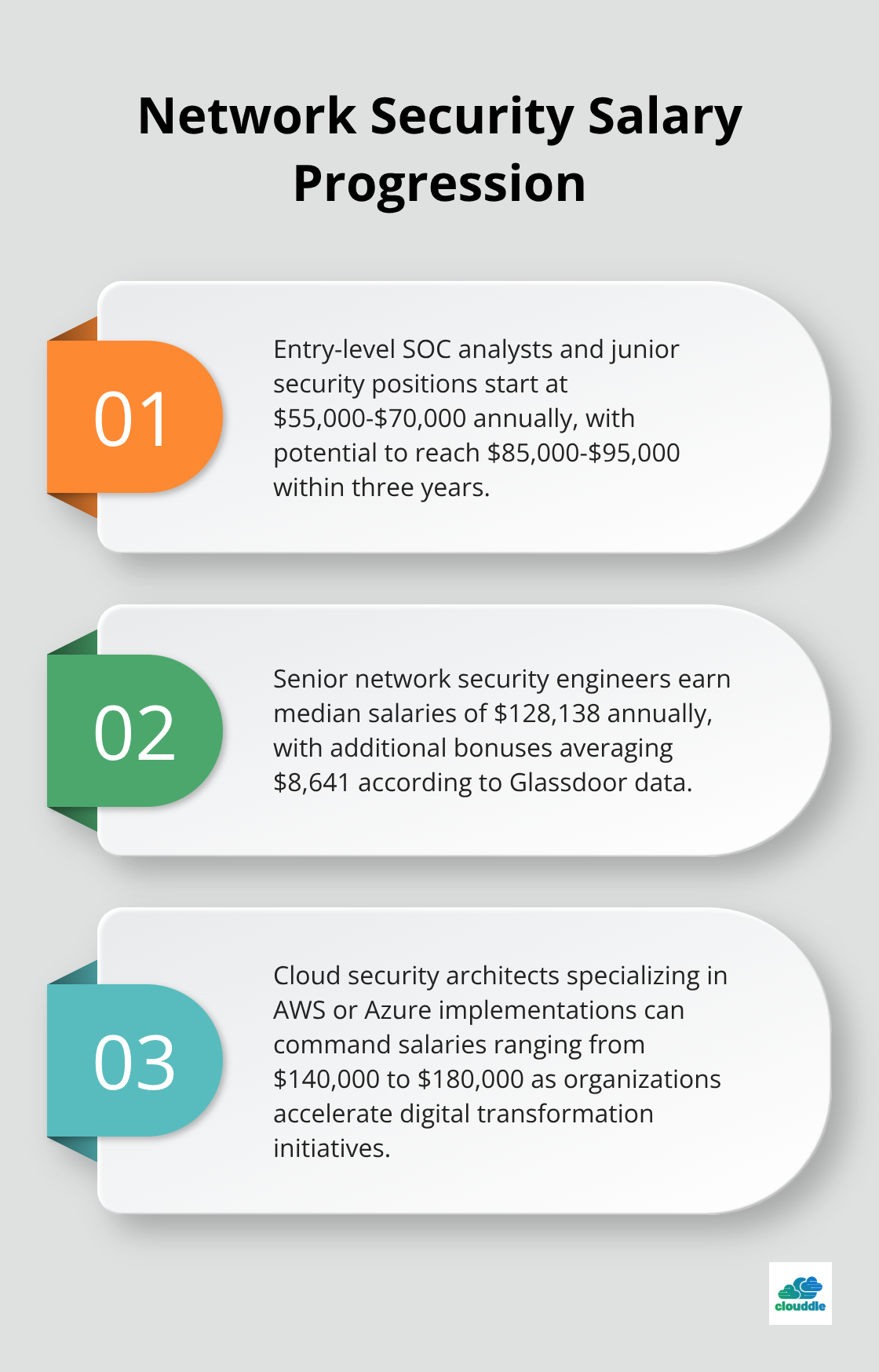Network security threats cost companies $4.45 million per breach on average in 2023. The demand for skilled professionals has never been higher.
We at Clouddle see organizations struggling to fill these critical roles. A structured network security engineer course combined with hands-on experience opens doors to this high-growth field.
This guide covers the exact steps to build your expertise and land your first role.
Essential Skills and Knowledge for Network Security Engineers
Network security engineers must master specific technical competencies that separate professionals from amateurs. Python and JavaScript serve as foundational languages for automation scripts and vulnerability assessments. The U.S. Bureau of Labor Statistics reports 29% job growth for information security analysts through 2034, which makes these skills essential for career advancement. TCP/IP protocol knowledge, firewall configuration, and intrusion detection systems represent the core networking expertise that employers demand. Security Information and Event Management platforms (like Splunk or IBM QRadar) require hands-on experience for effective threat monitoring.

Technical Skills in Networking and Cybersecurity
Programming proficiency extends beyond basic scripting to include advanced security tool development. Network engineers configure routers, switches, and security appliances while maintaining optimal performance levels. Vulnerability assessment tools like Nessus and OpenVAS help identify system weaknesses before attackers exploit them. Cloud security knowledge becomes increasingly valuable as organizations migrate infrastructure to AWS, Azure, and Google Cloud platforms. Endpoint security management protects individual devices from malware and unauthorized access attempts.
Understanding of Security Frameworks and Compliance
NIST Cybersecurity Framework and ISO 27001 standards govern enterprise security implementations across industries. Healthcare organizations face HIPAA requirements while financial services must meet PCI DSS compliance standards. Network security engineers who understand these frameworks command higher salaries, with the median reaching $124,910 annually according to industry data. CompTIA Security+ and Certified Information Systems Security Professional certifications validate framework knowledge that hiring managers prioritize. Penetration testing tools like Metasploit help identify compliance gaps before audits expose vulnerabilities.
Problem-Solving and Analytical Thinking Abilities
Critical thinking abilities determine success when engineers analyze network traffic patterns and identify anomalous behavior. Security professionals must correlate data from multiple sources to detect advanced persistent threats that basic monitoring tools miss. Incident response requires quick decision-making under pressure while maintaining detailed documentation for forensic analysis. Complex network architectures demand problem-solving skills that balance security requirements with business functionality. Technical communication skills influence budget approvals when engineers present security findings to non-technical stakeholders.
These foundational skills prepare professionals for the educational pathways and certifications that validate their expertise in the competitive job market.
Educational Pathways and Certifications
Computer science degrees provide the strongest foundation for network security roles, with 78% of hiring managers preferring candidates with formal IT education according to CompTIA research. Information technology, computer engineering, and cybersecurity programs offer specialized coursework in network protocols, cryptography, and risk assessment methodologies. Mathematics and engineering degrees work as alternatives when combined with targeted security training, though the learning curve becomes steeper for career changers.
Degree Requirements and Relevant Fields of Study
Network administration, database management, and operating systems courses translate directly to daily responsibilities in security roles. Programming classes in Python, Java, and C++ prepare students for vulnerability assessment and penetration testing tasks that employers prioritize. Internship programs at companies like IBM, Microsoft, and Cisco provide hands-on experience with enterprise security tools before graduation. Students should target programs that include lab components with real security hardware rather than theoretical coursework alone.
Industry Certifications That Matter Most
CompTIA Security+ certification opens entry-level doors across government and private sectors. Certified Information Systems Security Professional commands salary premiums with global averages of $119,577 annually for experienced professionals. Certified Ethical Hacker and CISSP certifications require work experience but accelerate advancement to senior roles within 3-5 years. Cisco CCNA Security and Juniper JNCIA-SEC validate vendor-specific skills that technical teams value during the process of hiring.

Continuing Education and Professional Development
Annual security conferences like RSA and Black Hat expose professionals to threats that emerge and provide opportunities to network with industry leaders. Online platforms (Cybrary and SANS) offer specialized courses in incident response, malware analysis, and cloud security architectures. Capture The Flag competitions sharpen practical skills while they demonstrate problem-solving abilities to potential employers. Professional associations like ISC2 and ISACA provide education credits that professionals need for certification maintenance and career advancement.
These educational foundations and certifications prepare professionals to enter the job market where specific career paths and salary expectations await exploration.
Career Growth and Opportunities
Entry-level network administrator and IT support roles provide the fastest path into security positions within 18-24 months. Junior security analyst positions at companies like Accenture and Deloitte offer competitive starting salaries, with rapid advancement potential for certified professionals. Help desk technicians who demonstrate security knowledge often transition to SOC analyst roles that pay ,000-,000 initially but reach ,000-,000 within three years according to PayScale data. Government contractors prioritize Security+ certified candidates for entry positions that start at GS-12 levels (equivalent to $72,000-$94,000 depending on location).
Entry-Level Positions and Career Progression
Security Operations Center analysts monitor threats and respond to incidents while they gain hands-on experience with SIEM platforms and forensic tools. Network technician roles at managed service providers expose professionals to diverse client environments and security challenges that accelerate their development. Cybersecurity internships at Fortune 500 companies convert to full-time offers for 73% of participants according to NACE research, which makes them strategic career investments. Junior penetration testers earn $70,000-$85,000 in starting salaries while they develop specialized skills that command premium rates within five years.
Salary Expectations and Job Market Trends
Senior network security engineers earn median salaries of $128,138 annually with bonuses that average $8,641 according to Glassdoor data. Cloud security architects who specialize in AWS or Azure implementations command 0,000-0,000 salaries as organizations accelerate digital transformation initiatives. Cybersecurity consultants who work independently average $106,328 annually while they choose their clients and project types. Information Security Manager positions reach $150,000-$200,000 compensation packages for professionals who combine technical expertise with business leadership skills.

Specialization Areas and Advanced Roles
The U.S. Bureau of Labor Statistics projects strong job growth for information security analysts, creating unprecedented opportunities for qualified professionals. Healthcare and financial services sectors offer salary premiums of 15-25% above market rates due to strict compliance requirements and high-value data protection needs. Remote work options expand geographic opportunities, with companies like GitLab and Automattic that hire security engineers regardless of location at competitive rates.
Final Thoughts
Network security engineers command median salaries above $128,000 with 29% job growth projected through 2034. Success demands mastery of Python programming, NIST frameworks, and CompTIA Security+ certification as foundational requirements. Entry-level SOC analyst or network administrator positions create pathways to senior roles within three years.
The career path begins with formal education in computer science or cybersecurity, then advances through internships or junior positions. A comprehensive network security engineer course accelerates skill development while industry certifications validate expertise to employers. Continuous learning through conferences and specialized training maintains competitiveness in this rapidly evolving field.
Organizations across healthcare, finance, and technology sectors need qualified security professionals immediately. Remote work opportunities expand geographic reach while cloud security or compliance specialization commands premium salaries (often 15-25% above market rates). We at Clouddle support organizations that recognize the value of technology solutions and security expertise in protecting business operations.


